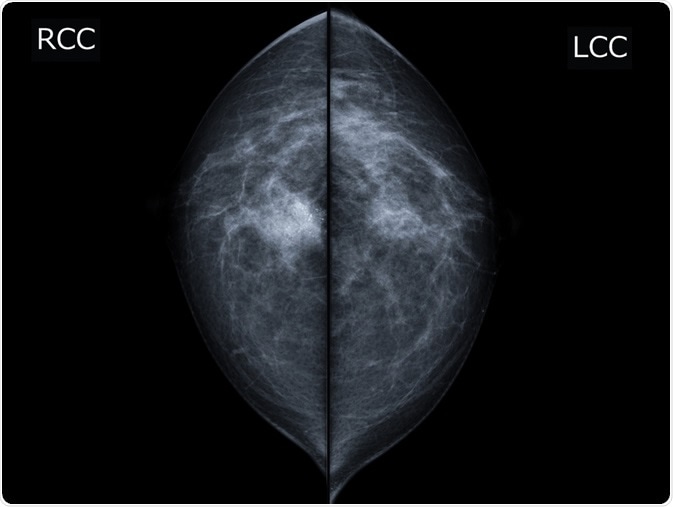Most women affected by breast cancer will have some form of surgery as part of their treatment plan, although the type of surgical procedure used will depend on the situation.

X-ray mammogram image of breast with cancer. - breast cancer of right breast. Image Credit: MossStudio / Shutterstock
There are several reasons why surgery may be indicated for patients with breast cancer. These include:
- Removing cancerous growth from the breast
- Investigating presence of cancer cells in lymph nodes
- Relieving symptoms associated with advanced breast cancer
- Reconstructing breasts following the cancer treatment
Each of these cases and the surgical procedures involved will be covered in more detail below.
Removal of Cancerous Growth from the Breast
There are two main surgical procedures that may be used to remove a cancerous growth from the breast: a mastectomy or breast-conserving surgery (BCS).
A mastectomy involves the removal of the entire breast and sometimes also the surrounding tissues. Some people also get a double mastectomy, which involves the removal of both breasts.
BCS, also sometimes referred to as a lumpectomy, quarrantectomy or partial/segmental mastectomy, involves the removal of part of the breast, where the cancerous growth has been found. With this technique, the aim is to remove all of the cancer cells and some of the healthy cells in the surrounding tissue, but leaving most of the breast intact. The extent of tissue that is removed will depend on characteristics of the tumor and the patient.
The most appropriate choice for each woman varies. Many women with early-stage breast cancer opt for BCS, as this technique allows her to retain most of her breast. However, this technique usually requires further treatment with radiotherapy to reduce the risk of recurrence, which may not be necessary for women who opt for a mastectomy. For advanced stage breast cancer or women with a strong family history of breast cancer, a mastectomy may be the best option to improve treatment outcomes.
Investigation of Lymph Node Involvement
There are two main surgical procedures that may be used to investigate the involvement of the nearby lymph nodes and detect cancerous growth: a sentinel lymph node biopsy or an axillary lymph node dissection.
This allows a sample of the cells to be taken, which can be examined under a microscope for signs of cancerous growth. This helps determine the stage of the cancer, which is an important factor for making treatment decisions in the future. Additionally, the lymph nodes can be removed as a part of the surgery or in a separate procedure if cancerous growth is found.
Relief of Symptoms of Advanced Breast Cancer
Surgery may also sometimes be used for patients with advanced-stage breast cancer to slow the spread of cancer or to relieve symptoms associated with the condition.
For example, surgical removal of metastatized cells in some areas of the body, such as the brain, spinal cord or liver, can help reduce complications associated with the growth of tumors in these areas of the body. Likewise, if a growth is causing significant pain, surgical removal of the tumor may be beneficial.
Breast Reconstruction
It is the personal choice of each woman whether they decide to have a breast reconstruction following a mastectomy or substantial BCS to restore the appearance of the area.
There are various types of breast reconstruction methods, and the best choice is decided upon based on the treatment methods used and the personal preferences of the woman. The type of surgery and successive treatments, such as radiotherapy, can guide the decision for the most appropriate type of reconstruction.
References
Further Reading
Last Updated: May 25, 2023